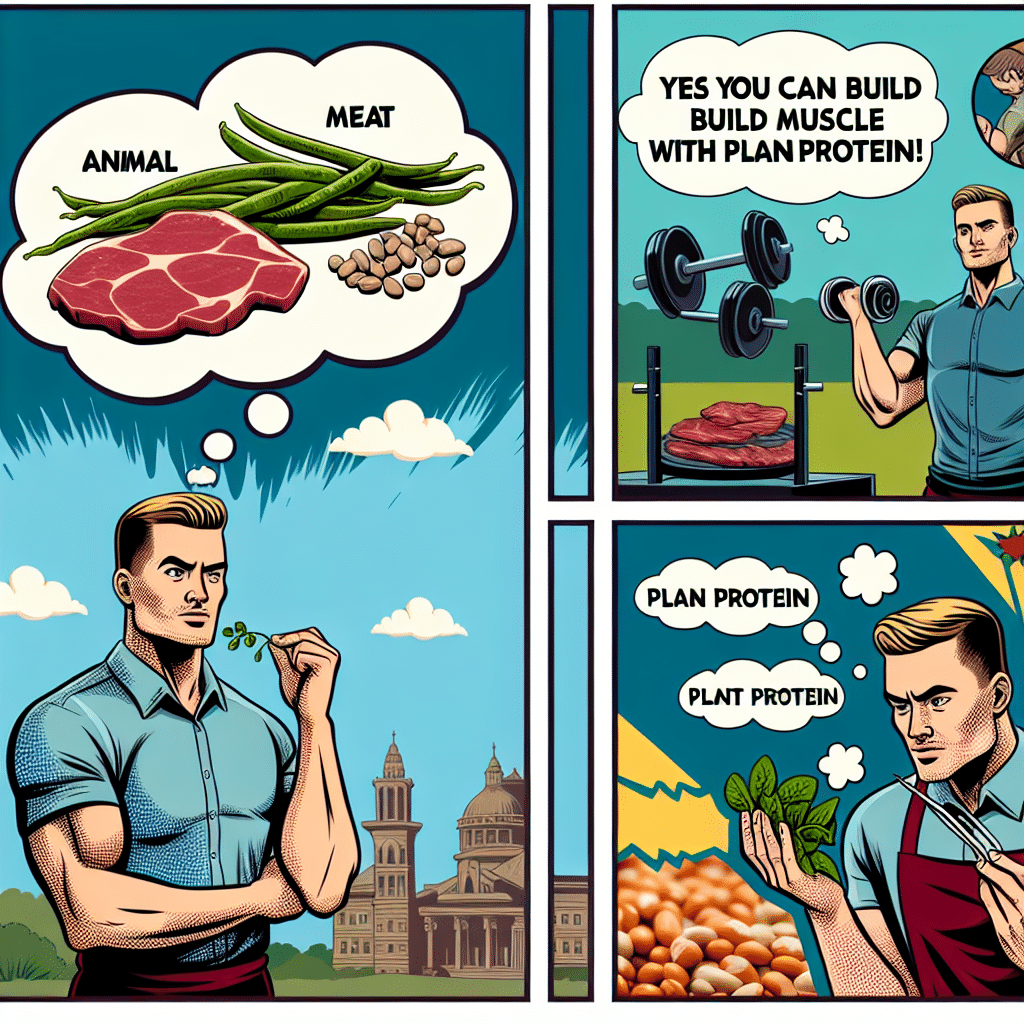Can You Build Muscle With Plant Protein?
-
Table of Contents
- Build Muscle with Plant Protein: A Viable Alternative to Animal Sources
- Understanding Protein and Muscle Synthesis
- Plant Protein vs. Animal Protein
- Combining Plant Proteins
- Digestibility and Absorption
- Research on Plant Protein and Muscle Building
- Case Studies and Examples
- Statistics Supporting Plant Protein
- How to Maximize Muscle Growth with Plant Protein
- Conclusion: Plant Protein as a Muscle-Building Ally
- ETprotein: Your Source for High-Quality Plant Protein
Build Muscle with Plant Protein: A Viable Alternative to Animal Sources

When it comes to building muscle, protein is the cornerstone of muscle repair and growth. Traditionally, animal proteins have been the go-to source for many fitness enthusiasts and bodybuilders. However, with the rise of plant-based diets and increased awareness of sustainability and health, the question arises: Can you build muscle with plant protein? This article delves into the science behind plant protein, its effectiveness in muscle synthesis, and how it compares to animal protein.
Understanding Protein and Muscle Synthesis
Protein is made up of amino acids, which are the building blocks of muscle tissue. When you exercise, especially during resistance training, you create micro-tears in your muscle fibers. Protein helps repair these tears, which in turn leads to muscle growth. The process of muscle protein synthesis (MPS) is critical for muscle repair and hypertrophy (growth).
Plant Protein vs. Animal Protein
Animal proteins, such as whey, casein, and meat, are known as complete proteins because they contain all nine essential amino acids that the human body cannot produce on its own. Plant proteins, on the other hand, are often considered incomplete because they may lack one or more of these essential amino acids. However, this does not mean that plant proteins cannot support muscle building.
Combining Plant Proteins
By combining different plant protein sources, you can create a complete amino acid profile. For example, rice protein is low in lysine but high in methionine, while pea protein is low in methionine but high in lysine. Together, they provide a balanced amino acid profile. Here are some plant-based protein combinations:
- Rice and pea protein
- Beans and rice
- Hummus and whole grain bread
- Nut butter on whole grain toast
Digestibility and Absorption
Another factor to consider is the digestibility of plant proteins. Animal proteins are generally more easily digested and absorbed than plant proteins. However, advancements in food processing have improved the digestibility of plant proteins, making them more comparable to their animal counterparts.
Research on Plant Protein and Muscle Building
Several studies have investigated the efficacy of plant-based proteins in muscle synthesis. A study published in the American Journal of Clinical Nutrition found that when the total protein intake is adequate, the source of protein—plant or animal—did not significantly affect muscle strength or size gains.
Case Studies and Examples
There are numerous examples of successful athletes and bodybuilders who follow plant-based diets. For instance, Patrik Baboumian, one of the world’s strongest men, and Venus Williams, a professional tennis player, both attribute their strength and endurance to plant-based diets rich in protein.
Statistics Supporting Plant Protein
According to a 2019 review in the journal Nutrients, plant-based diets do not compromise athletic performance and may even provide advantages for muscle endurance and recovery. Furthermore, the global plant-based protein market is expected to grow significantly, indicating a rising acceptance and demand for plant-based protein sources.
How to Maximize Muscle Growth with Plant Protein
To effectively build muscle with plant protein, consider the following strategies:
- Consume a variety of plant protein sources to ensure a complete amino acid profile.
- Ensure adequate total protein intake based on your body weight and activity level.
- Incorporate protein-rich snacks and meals throughout the day to maintain a positive protein balance.
- Consider plant-based protein supplements, such as pea or rice protein powders, to meet protein needs.
Conclusion: Plant Protein as a Muscle-Building Ally
In conclusion, building muscle with plant protein is not only possible but can be just as effective as using animal protein when done correctly. By ensuring a varied diet with adequate protein intake and combining different plant proteins, individuals can achieve their muscle-building goals while enjoying the additional health and environmental benefits of a plant-based diet.
ETprotein: Your Source for High-Quality Plant Protein
If you’re looking to incorporate plant-based proteins into your diet to support muscle growth, ETprotein offers a range of high-quality, organic vegan protein products. Their selection includes organic rice protein, pea protein, and other plant-based options, all characterized by a neutral taste and non-GMO, allergen-free attributes. With purity levels over 98%, ETprotein’s products are suitable for a variety of industries, including sports nutrition and health and wellness.
For those interested in exploring the benefits of plant protein for muscle building, ETprotein provides a reliable source of high-quality ingredients. To learn more about their offerings or to sample their products, contact ETprotein and email sales(at)ETprotein.com today.
About ETprotein:
ETprotein, a reputable protein and L-(+)-Ergothioneine (EGT) Chinese factory manufacturer and supplier, is renowned for producing, stocking, exporting, and delivering the highest quality organic bulk vegan proteins and L-(+)-Ergothioneine. They include Organic rice protein, clear rice protein, pea protein, clear pea protein, watermelon seed protein, pumpkin seed protein, sunflower seed protein, mung bean protein, peanut protein, and L-(+)-Ergothioneine EGT Pharmaceutical grade, L-(+)-Ergothioneine EGT food grade, L-(+)-Ergothioneine EGT cosmetic grade, L-(+)-Ergothioneine EGT reference grade and L-(+)-Ergothioneine EGT standard. Their offerings, characterized by a neutral taste, non-GMO, allergen-free attributes, with L-(+)-Ergothioneine purity over 98%, 99%, cater to a diverse range of industries. They serve nutraceutical, pharmaceutical, cosmeceutical, veterinary, as well as food and beverage finished product distributors, traders, and manufacturers across Europe, USA, Canada, Australia, Thailand, Japan, Korea, Brazil, and Chile, among others.
ETprotein specialization includes exporting and delivering tailor-made protein powder and finished nutritional supplements. Their extensive product range covers sectors like Food and Beverage, Sports Nutrition, Weight Management, Dietary Supplements, Health and Wellness Products, and Infant Formula, ensuring comprehensive solutions to meet all your protein needs.
As a trusted company by leading global food and beverage brands and Fortune 500 companies, ETprotein reinforces China’s reputation in the global arena. For more information or to sample their products, please contact them and email sales(at)ETprotein.com today.














